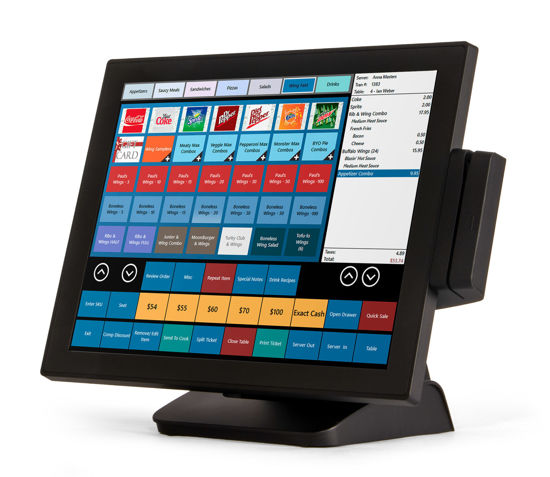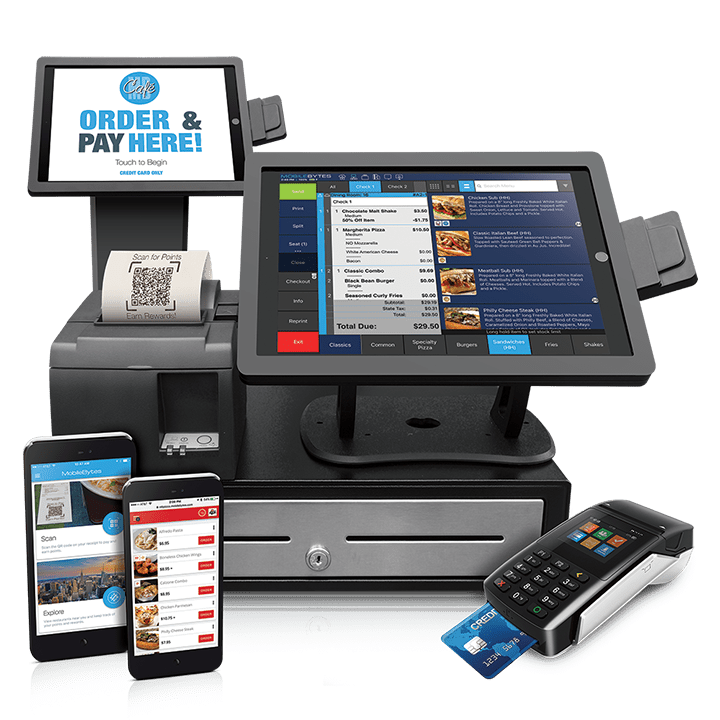Point Of Sale Fundamentals Explained

Point of Sale Software: Retail Point-Of-Sale Solutions Streamline Deals
Some Known Facts About Pos Machine.

Hardware Parts of a Point of Sale System What makes a POS system tick? It's not simply software application; the hardware plays a starring function. Think about it as the body to the software's brain. Without the right hardware, even the most advanced POS software application is simply a pretty face. Essential POS Hardware So, what are the must-haves? Let's break it down. The main processing system, often a computer or tablet, is the heart of the operation. The display or touchscreen show allows personnel to interact with the system. A barcode scanner accelerate the checkout process. Keep in mind the days of manually going into each code? The dependable receipt printer offers customers with a record of their purchase. A money drawer keeps your cash safe and organized. A card reader permits customers to pay with credit or debit cards. Diving Deeper: Beyond the Fundamentals However wait, there's more! Depending on your service, you may need specific hardware. For instance, a dining establishment may integrate kitchen area printers to relay orders, while a store may use label printers for item tagging. Ever question how your local bakery instantly prints those delicious-looking labels? Picking the Right Hardware: A Balancing Act Choosing the right hardware isn't practically buying the most costly equipment. It's about finding the sweet area in between functionality, sturdiness, and budget plan. A small company just starting out may go with a more basic setup, while a high-volume seller will need robust, high-performance devices. Is it better to purchase new or utilized? Consider your alternatives thoroughly. A brand-new system offers the most current innovation and warranty defense, however a reconditioned system can save you money. The Future of POS Hardware What does the future hold? Expect to see a lot more combination with mobile phones, biometric scanners for employee authentication, and advanced analytics dashboards displayed on larger, clearer screens. Think click here of a world where inventory is instantly upgraded in real-time as items are scanned-- a world where you can track your very popular product from throughout the world. The possibilities are unlimited, and the hardware is constantly evolving to meet the demands these days's businesses. Are you ready to update your point of sale system?
Software Features and Capabilities: The Heart of Your POS System
Ever watch a skilled barista move through a busy early morning rush? Their trick isn't just caffeine; it's a seamless dance with their POS system. The software is the conductor of your organization symphony, managing everything from sales to stock. What notes should you be listening for? What capabilities truly matter in today's market?
Inventory Management: Beyond Counting Beans
Forget spreadsheets that haunt your dreams. Modern POS systems provide real-time inventory tracking, notifying you when your stock of artisanal coffee beans dips precariously low. Consider it as a digital guardian angel, avoiding those uncomfortable "Sorry, we're out!" moments to customers. What if you could also forecast demand based on historical information? Many systems now use forecasting tools, an effective weapon versus overstocking and lost sales. This assists avoid the situation of running out of popular products or accumulating excess stock of slow-moving items, both of which can constrain capital and space.
Sales Reporting and Analytics: Decoding the Information
Sales data is the new gold, and your POS system is the miner. Forget just knowing just how much you sold today. Dive deep into the information to uncover patterns, recognize your best-selling products, and comprehend consumer behavior. Which menu product sets completely with the day-to-day special? Which promotion resonated most with your clients? These insights are not just interesting; they're actionable intelligence. Without trusted sales reporting, navigating the complexities of organization decision-making ends up being like cruising without a compass, increasing the opportunity of bad moves and missed opportunities.
Client Relationship Management (CRM): Building Bridges, Not Walls
Remembering a routine client's name and favorite order is charming, however scaling that individual touch is challenging. POS systems with CRM abilities allow you to track consumer purchase history, choices, and even birthdays. Envision instantly offering a discount on their birthday-- a little gesture that fosters commitment and encourages repeat organization. But there is the prospective snag of poor data quality, which can result in inaccurate consumer profiles and inefficient marketing efforts.
Payment Processing: Improving the Deal
The checkout experience can make or break a sale. Smooth integration with various payment techniques-- credit cards, mobile wallets, even copyright-- is non-negotiable. Can your system deal with split payments? Does it use protected tokenization to safeguard consumer data? A cumbersome payment procedure resembles hitting a sour note in your company symphony, possibly interfering with the entire efficiency. Ensuring compatibility with developing payment technologies and adherence to security standards are paramount for preserving client trust and functional effectiveness.
Worker Management: Keeping the Team in Sync
From clocking in and out to handling permissions and tracking efficiency, employee management includes improve operations and enhance accountability. Is scheduling a nightmare? Lots of POS systems provide incorporated scheduling tools, optimizing staffing levels based upon anticipated need. A typical barrier that is typically neglected is the difficulty of integrating employee management performances with payroll systems, which can result in mistakes and inadequacies in wage calculations.
Advanced Features: Leveling Up Your Operations
- Table Management: Suitable for dining establishments, this feature permits you to picture your dining-room, track table status, and manage bookings.
- Commitment Programs: Reward your finest customers and motivate repeat organization with incorporated loyalty programs.
- Online Purchasing Integration: Perfectly incorporate your POS system with online ordering platforms to broaden your reach.
Choosing the ideal POS system has to do with more than simply functionality; it has to do with finding a partner that can grow with your business. Consider your current needs, expect future growth, and do not be scared to ask the tough concerns. The ideal software application can change your service from a disorderly cacophony into a harmonious masterpiece.
Industry-Specific POS System Applications
Believe of the regional pastry shop, bustling with early morning consumers yearning fresh croissants. A generic POS system might deal with transactions, but can it handle complicated dishes, track ingredient inventory, or instantly adjust production schedules based upon sales data? Probably not. That is where the appeal of industry-specific POS systems shines.
Restaurants and Hospitality
For dynamic restaurants, speed and precision are critical. How many times have you seen servers juggling orders, adjustments, and splitting bills, all while trying to offer outstanding service? A dining establishment POS system enhances these procedures, permitting table management, cooking area order tickets, and even online ordering integration. These systems typically include functions like ingredient-level stock tracking, vital for handling food expenses and reducing waste. Ever wonder why your preferred dish is in some cases unavailable? It might come from an absence of correct stock management.
- Table Management
- Kitchen Order Tickets
- Online Buying Combination
- Ingredient-Level Inventory Tracking
Retail Solutions
Retail, with its diverse inventory and customer interactions, requires a different set of tools. Think of a shop clothing store having a hard time to keep an eye on sizes, colors, and seasonal collections using a basic checkout system. An industry-specific retail POS system provides functions like barcode scanning, consumer commitment programs, and comprehensive sales reporting. These systems can even incorporate with e-commerce platforms, offering a seamless omnichannel experience for customers. Did you understand some retail POS systems can predict future sales trends based on historic data? Now that is powerful!
The Dangers of an Inequality
Picking the incorrect POS system can produce significant operational difficulties. A clothing shop utilizing a restaurant POS, for instance, would discover it unsuitable for managing inventory with sizes and colors. The absence of correct reporting and analytics could result in mistaken buying decisions and lost earnings. The result might be similar to attempting to fit a square peg in a round hole.
Secret Factors to consider
Picking an industry-specific POS system needs cautious examination. Think of your company's unique requirements and functional workflows. Does the system integrate with existing software? Does it offer the necessary reporting capabilities? Is it scalable to accommodate future growth? A well-chosen POS system is not just a deal tool; it's a tactical possession that can drive performance, enhance client satisfaction, and eventually, improve your bottom line. Keep in mind, it is an investment in your business's future, not simply a cost.
Security Factors To Consider for Point of Sale Systems
Ever heard the tale of the mom-and-pop store that lost everything since of a single, neglected security flaw in their POS system!.?. !? It's a cautionary tale, and it highlights a vital element often eclipsed by the allure of fancy features and streamlined operations. The truth is, a POS system is just as excellent as its security. What excellent is a system that crunches numbers in a flash if it enables wrongdoers to swipe client's data just as quickly?
The Vulnerability Minefield
The digital landscape is a battleground. Every POS system, no matter size or sophistication, is a possible target. Are you genuinely got ready for the threats lurking around the corner? The real pinch comes when you discover that your out-of-date software application has an open hole that hackers can exploit, turning your company into an unwitting accomplice in identity theft. The difficulty is that hackers are crafty and are constantly altering their strategies.
Common Security Gaps and Expert Tips
- Weak Passwords: "Password123" isn't cutting it. Use strong, distinct passwords for all POS system accounts and change them routinely. Two-factor authentication is a must.
- Unsecured Networks: Your Wi-Fi is like leaving the front door open. Protect your network with strong encryption (WPA3 if possible) and consider a different network for your POS system.
- Out-of-date Software: Software vendors spot security holes all the time. Stopping working to upgrade resembles inviting problem. Establish automated updates or schedule routine upkeep.
- Worker Training: Your personnel is your first line of defense. Train them to recognize phishing efforts, protect passwords, and report suspicious activity.
Data File Encryption: Your Guard Versus the Dark Arts
Think of information file encryption as a secret code. It scrambles delicate information, like credit card numbers, making it unreadable to unapproved users. Without encryption, your clients' financial information are like sitting ducks, ripe for the selecting by cybercriminals. It's not almost protecting your consumers; it has to do with safeguarding your track record and avoiding large fines.
PCI Compliance: The Rulebook You Can't Neglect
If you accept credit cards, you're bound by the Payment Card Market Data Security Requirement (PCI DSS) It's a set of security standards created to safeguard cardholder information. Failing to comply can lead to fines, penalties, and even the loss of your capability to process charge card payments. It's a headache, yes, but it's a required one. Think of PCI compliance as the expense of doing organization in the digital age.
Consider this: every transaction processed through your point of sale is a possible entry point for harmful actors. By carrying out robust security procedures, you're not just safeguarding your organization; you're safeguarding your clients' trust and guaranteeing the long-term practicality of your operations. The security of your POS system isn't just a technical problem; it's a company essential. It requires continuous watchfulness, proactive procedures, and a commitment to remaining ahead of the curve.